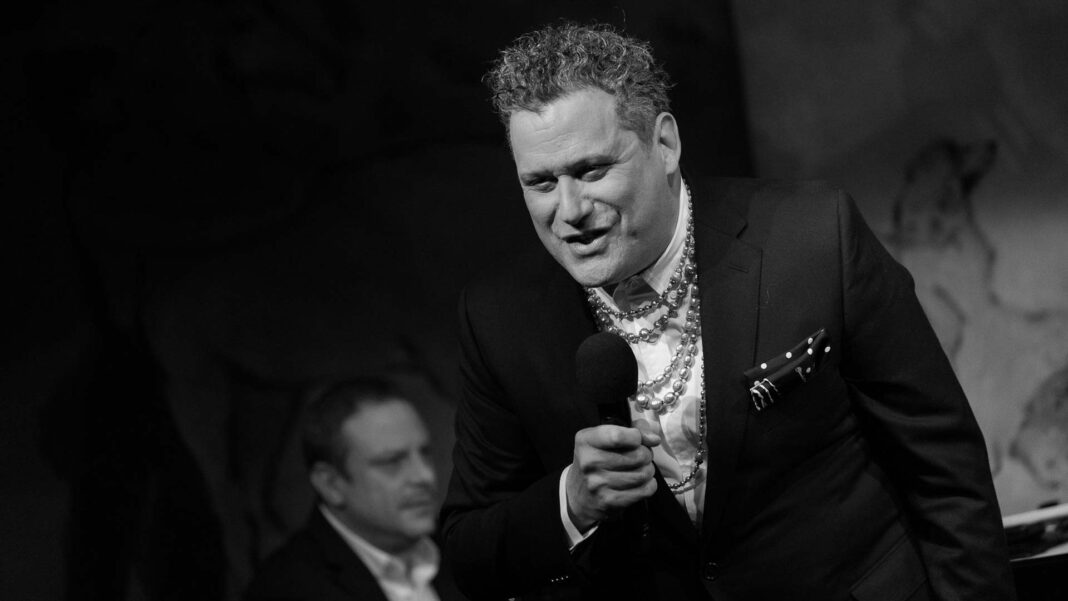THIS IS THE BEGINNING OF OUR BEST OF 23 REVIEW OF INTERVIEWS: He’s a fashion designer (obviously). He’s directed musicals. He’s designed clothes for opera. He’s been a judge on Project Runway. If you look closely he had a small part in Alan Parker’s 1980 film Fame (which makes since he went to La Guardia Arts). He’s also been booked several times at the Cafe Carlyle in New York City to sing some of his favorite songs. However you know Isaac Mizrahi, the singing part might comes as a bit of a surprise.
But it didn’t to Mizrahi. Fashion was the surprise, music was the first love.
On Saturday Mizrahi will be making his Los Angeles-area singing debut at The Wallis. So what better time to talk to the perfectly frank Mizrahi to discuss his passion for music, the songs and singers that inspire him and the place where fashion and music overlap.
What follows are excerpts from our conversation. To see the full interview, please go to our YouTube channel. And I recommend you do. Everything he says is even better when you hear his voice!
But before we get started…a little of the musical stylings of Isaac Mizrahi.
I saw an interview that you did before you started performing at the Carlyle and you said that the eighth grade version of you would have been very surprised that you went into fashion and would have assumed that you would have gone into music. What would that eighth grader think of you performing at venues like the Cafe Carlyle, somewhere in Beverly Hills or around the world?
I think that the eighth grader would have been way less surprised, but also extremely, extremely proud and happy. What I love is that I’ve lived this incredible life which kind of informs my stage presence, you know? I mean, even when I’m acting. I just got through on Broadway as Amos Hart in Chicago. When I’m actually playing a character that is really informed by the past like 35 years of my life pursuing something so fervently and doing a lot.
I do a lot, you know, And at the same time that I was making these clothes, I was I was still performing with my band and working with Ben Waltzer and doing these small gigs. Now it’s kind of taking center stage in my life.
There was a time when I thought I had kind of chosen the wrong path. I really mean it. Why did I do that fashion thing when it makes me so happy to be on stage and to be performing? I mean, fashion makes me happy, but in a completely different way. It’s the damage control side of me. I like being this this person who runs after people and re-ties their bows better, you know. So that’s sort of what that’s about. And I still do it. Let’s face it, I do have a really big fashion business and I’m very pleased about that.
As you’re talking the idea of you playing Amos Hart is rather ironic to me. A man who isn’t visible, who isn’t being seen. That seems like it is exactly the polar opposite of you.
There is a part of that I can so relate to. You know, I don’t care who you are. I don’t care how flamboyant you are, how sort of like beautiful you are. There is a side of you that always feels not seen. That is what I tapped into.
You’re quoted as saying “I don’t like people to feel completely described by the clothes they wear of mine. I want them to feel that they’re describing themselves.” What can we learn about you from the songs you choose to perform and the way you choose to perform them?
The funny thing is this is going to sound like a trite answer to such a smart question. I feel like the songs choose me, you know, the way clothes choose you or the way a pastry chooses you when you walk into a bakery. The thing just calls out and you look at it, you go, I must eat that, you know? It’s the same way.
There are certain things that I feel really comfortable wearing because I feel like they fit well and there are certain songs that are just begging to be done by me. It’s really a very mysterious and emotional process by which you pick songs. At the end of the day, you know, when you’ve rehearsed it and put it together and it’s in the show, it makes a lot of sense.
There’s one thing I love about the press release that came out for the show at the Wallis, because it says you’ll be you’ll be performing soon-to-be classic songs. How do you define what a soon-to-be classic song is?
To me Billie Eilish is a genius, right? So if she writes something, it is soon-to-be classic, you know? You know what else is soon-to-be classic? Well, you’ll see. I don’t want to spoil stuff.
I just wanted to get a definition of what soon-to-be classic is.

Some songs that may in the past have been considered silly fluff which I absolutely think are not silly fluff and I absolutely adore. Like my opening number, which at the Annenberg will probably be I’ll Plant My Own Tree from Valley of the Dolls. It’s this amazing arrangement that we killed ourselves over. I feel like maybe that’s not considered a classic, but soon-to-be considered classic after you hear my cover of it. And darling, you might hate it, so maybe it won’t be classic. That’s why I say perhaps soon-to-be classic.
Your Instagram account has a couple of photographs of encounters you had with Stephen Sondheim. His music is is apparently going to be part of your show. What do you remember most about your encounters with Steve?
His is a kind of resonance in our backgrounds. He’s a native New Yorker and so am I, so there’s this kind of similarity in the way we see the world. There’s a similarity in our senses of humor. His wicked, wicked sense of humor. And I look up to him. Of course, everybody looks up to him.
I went to the revival of Merrily We Roll Along and I just cried for the entire two-and-a-half hours. I was just sobbing through the whole thing because there’s a way that he has of looking at the world that I always aspire to. There has never been a greater teacher to me in terms of, not necessarily how I look at musical theater, but just the way I look at life.
I groomed myself to be like a sort of a living, breathing Stephen Sondheim character. I can’t drink as much as all that because I’m allergic to it or something. But that’s the only thing about me that is not like typically Sondheim in, you know, not just in terms of the music that I do or my love of musical theater or something, but as an adult person.
You don’t just have the perspective as a singer with Stephen Sondheim’s music. You have the perspective of having directed A Little Night Music in 2010 [at The Opera Theatre of St. Louis]. How does the director who had that experience influence the singer who now performs the songs?
Knowing Steve and really knowing this person for a very long time, he didn’t really regard singer’s voices to be the greatest things. He loved a good singer. Let’s face it. He loved Barbara Cook. He loved people who could really sing and produce a sound. But I think he valued more people who could tell stories like Beth Howland [the original “Amy” in Company]. He adored Beth Howland. He adored Barbara Barrie [the original “Sarah” in Company]. These are not necessarily people you would cast for their singing voices. He loved the way [Elaine] Stritch could sing.
I was supposed to have [Stritch] on my show. And they said, if you want to do a pre-interview with her the only time she could do it is 3:00 in the morning because she’s like this big insomniac. So I called her at 3:00 morning because I am, too.
She said, Oh, I’m such a great raconteur, you know, blah, blah. And I thought, No, darling. I said you are a great musician. Kristin Chenoweth is amazing and she can produce almost an operatic sound. It’s an incredible instrument. And I know Sondheim adored the way she sang. But to me they are equals as musicians. Kristin Chenoweth and Elaine Stritch were the same to me.
What do you see as as what fashion and music have in common?
Clothing is a lot about styling, you know, put juxtaposing things next to each other that are extremely interesting that have not been done before. So I’m really good at arranging the song in the way that I want it to be presented and then perceived. But more than that, darling, don’t bother me if you’re going to do the song in exactly the same way or worse than the way the person who did it. I give it my way of making it something a little to me better, or at least better from my perspective.
You have your riffs and and your patter that you bring into your concerts. I love the whole idea that you said in one of the clips on your Instagram page that when you get older you do not get better looking.
It’s just the truth.
What is your relationship to getting older?
This is part of what I’m going to be talking about in this particular show. I’ve turned some kind of crazy corner on my whole life. I look at pictures and I’m reading Instagram and there’s like 17 complimentary comments. There’s one hateful thing that somebody says and I’ve started to like them. I started to like the haters almost more than I like the likers. It’s like liking the haters. I love these pictures of myself where I look like a fat old Jew. I love it. I recommend these pictures of me as a fat old queen.
It’s also nice to take the hate away from the haters, too, isn’t it?
By going “Darlings, I never meant for you to like me.” I adore the controversy. Yes.
You’ve directed a production of Peter and the Wolf, you’re singing around the world, you’ve directed opera, you’ve designed clothes for opera. Are you spending the next chapter of your life trying to prove F. Scott Fitzgerald wrong that there are truly second and third acts in American life?
Yes. The answer is very simple. One of the things that Steve used to say to me all the time, he’s like, “Oh, darling, you’re a polymath.” And I thought he was like Oh, you’re such a polymath, right? That means you suck at everything, whereas he is this great master.
By the way, Stephen Sondheim and Mark Morris, my friends. Go figure that out. They do one unbelievably exquisite thing. That’s all they do, right? Steve just wrote those words and that incredible music and made those shows. Mark just makes those masterful poetic dances. That’s all he does. Here I am doing cooking videos and I can’t not be that person. Now I’m kind of thinking of those words of Steve going, “Oh, you’re such a polymath.” And I think he really meant it as a compliment.
It must be nice to have that gift from Steve now that he’s no longer here.
It is. It really, really is. At least in my fantasy, by the way.
To see the full interview with Isaac Mizrahi, please go here.
Main Photo: Isaac Mizrahi (©David Andrako/Courtesy The Wallis)











